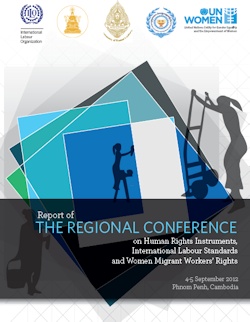The Conference provided a forum for good practices and lessons learned by delegates, canvassed regional frameworks and cooperation efforts on labour migration governance, as well as national efforts to protect women migrant workers by implementing gender-responsive, rights-based labour migration laws and policies, and creative strategies and advocacy by women migrant workers to claim their rights and celebrate their contributions towards sustainable development. The Conference also reinforced the importance of multi-stakeholder and multi-sectoral cooperation to empower women migrant workers, at the national level through inter-ministerial coordination and the capacitated engagement of women migrant workers and their organizations in decision-making processes; at the bilateral level through memorandums of understanding between origin and destination countries; and at sub-regional and regional levels through regional organizations and policy dialogues. Most importantly, the Conference highlighted the resilience and determination of women migrant workers to empower themselves, uplift their families and communities out of poverty and achieve justice by persistently voicing their claims to human rights and labour and social protection. The Outcome Document of the Conference, the Phnom Penh Conclusions and Recommendations, outlines concrete, future-oriented actions all delegates will undertake in their respective countries and organizations. The Phnom Penh Conclusions and Recommendations attached to this Report in Annex 4 do more than capture the intentions of the Regional Conference. They function as a tool to galvanize commitments making human rights a reality for women migrant workers across Asia, building just societies and generating sustainable development.
View online/download
Order printed/published version
Languages available in print
English
Bibliographic information

